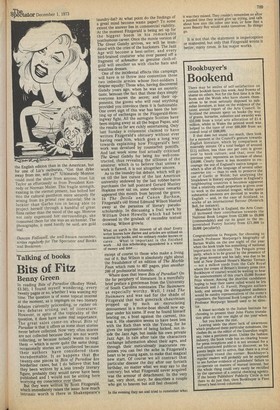Bookbuyer's
Bookend
There may be smiles of self-satisfaction on certain bookish faces this week. And frowns of shame on others. Not for the first time it is the Scots and the Welsh who have shown themselves to be most seriously disposed to subsidise literature, at least on the evidence of the latest annual report of the Arts Council. In Scotland the amount spent on books (by way of grants, bursaries, subsidies and awards) was 03,000 from a total arts allocation of £1.4 million, whilst in Wales the printed word was helped to the tune of over £68,000 from an overall total of £886,000.
If that does not sound too much, then look for a moment at the Council's gesture towards English literature, which by comparison is miserably minute. Of a total budget of around E111 million, less than one per cent is given over to book culture, and that, over the previous year, represents an increase of about £10,000. Clearly there is less incentive to encourage the use of England's native tongue — which is after all the language of several other countries too — than to seek to preserve the use of Gaelic or Welsh; but analysing the breakdown in literary expenditure in England's neighbouring countries it becomes apparent that a relatively small proportion is given over to work in the national tongue, whilst quite substantial amounts are devoted to works in English — and, in the case of Scotland, to works of an international flavour (Heinrich Boll, for instance).
Meanwhile back in England, the Arts Council increased their contribution towards the National Book League from '£2,500 to E8,000 (commendably) and cut its grant to the impoverished Poetry Society from £11,000 to £6,000 (peculiarly).
Congratulations to Penguin, for choosing to launch Professor Morpurgo's biography of Barnes Wallis on the one night of the year when the book trade has something of national importance to celebrate. The Penguin press party, which is to be graced by the presence of the great inventor and his lady, was due to be held at New Zealand House's Martini Terrace — not a million yards from the Cafe Royal' where the cream of Britain's literary press (not Bookbuyer of course) would be waiting to hear the announcement of this year's £5,000 Booker Prize winner. Among the shortlist candidates hoping to hear their name called would be Iris Murdoch and J. G. Farrell, Penguin authors both; and among the distinguished audience would be sundry representatives of the event's organisers, the National Book League, of which Professor Morpurgo himself used to be director.
A lesser accolade te the Italian Institute for choosing to present their John Florio translation prize on the one night of the year•when . . . but you know the rest. Leaving aside the sheer lack of awareness which produced these particular nonsenses, the clashes do, as the editor of the Guardian might say, raise a pertinent point. Unlike the fashion industry, the book trade has no clearing house for press receptions and it is not unusual for a well-intentioned publicist to discover, as his guests begin not to arrive, that there is a rival attraction round the corner. Bookbuyer's regular readers will probably not be surprised to see further evidence of publishers' failure to co-operate on matters of mutual interest, but the whole thing could very easily be rectified by the operation of a central checking agency. If the boozy Publishers' Publicity Circle is not there to do just that, then Bookbuyer is Fleet Street's best-loved columnist.
•










































 Previous page
Previous page